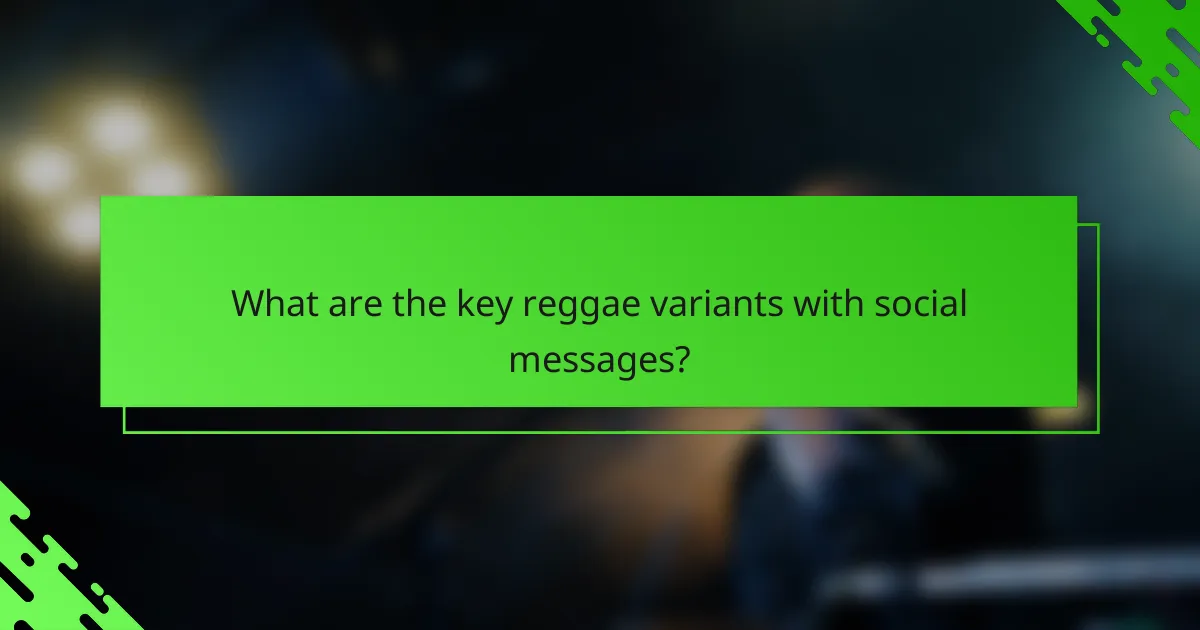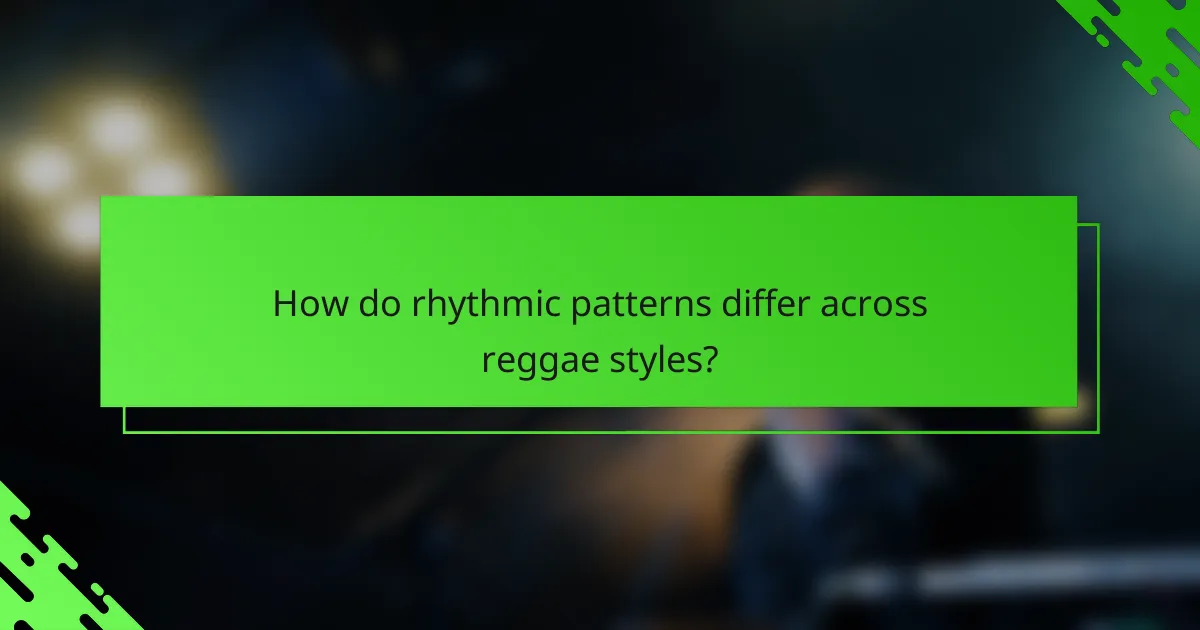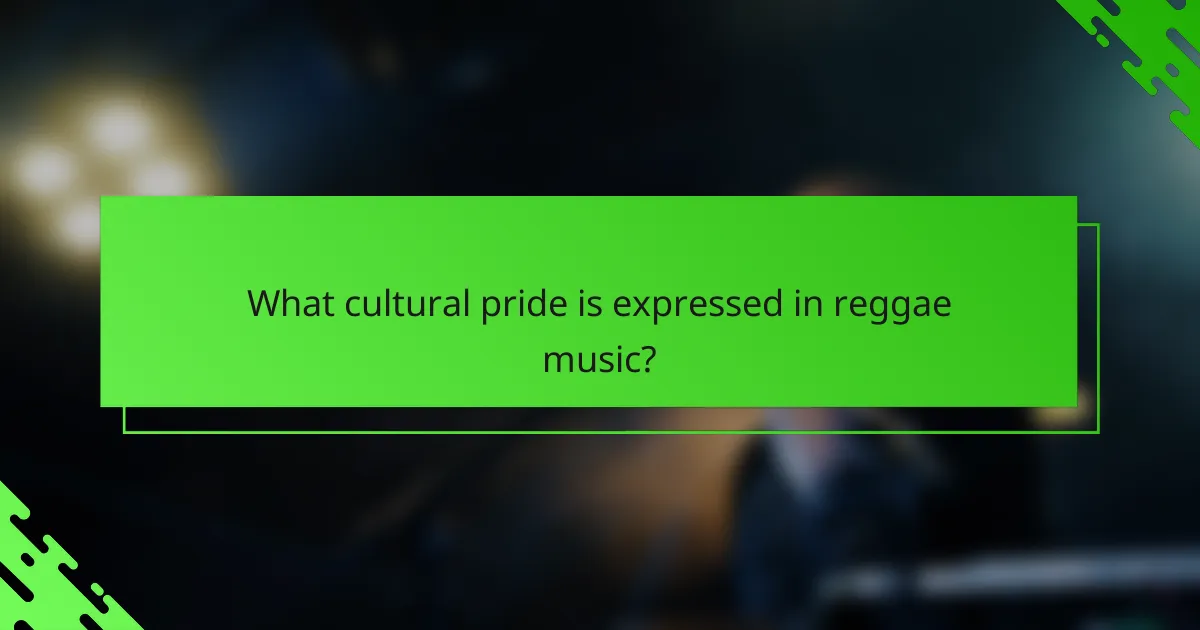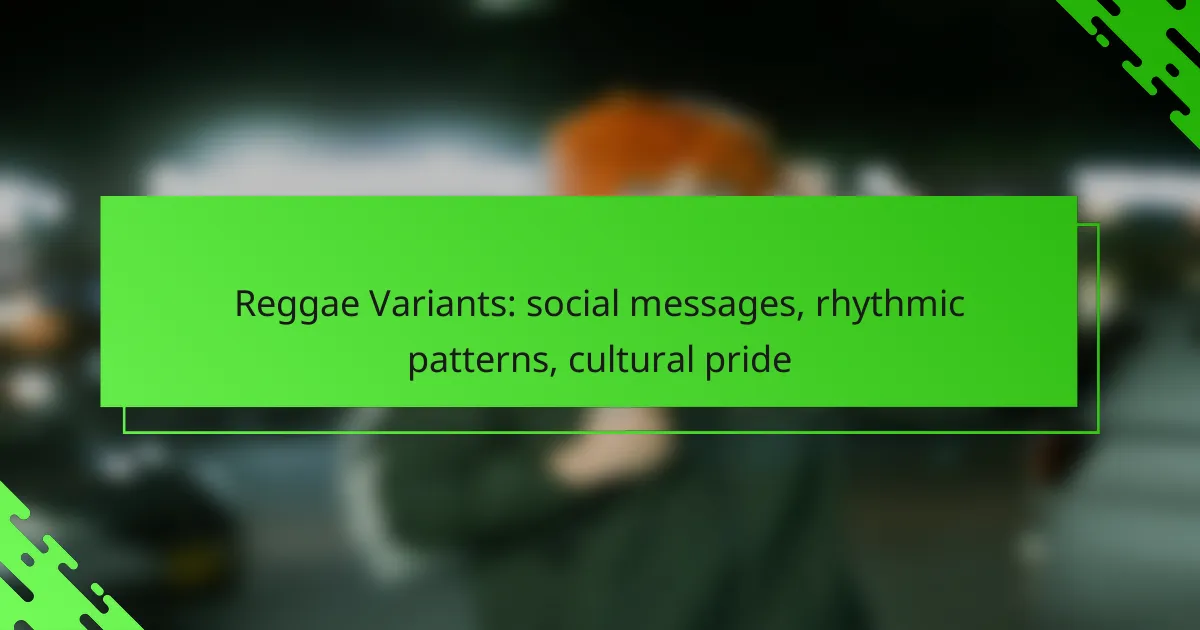Reggae music encompasses a variety of styles, including roots reggae, dancehall, dub, reggae fusion, and rocksteady, each rich with social messages and cultural pride. The distinct rhythmic patterns found in these variants not only shape their unique sounds but also enhance the expression of community struggles and social justice themes. Through its powerful lyrics and infectious grooves, reggae serves as a vital medium for celebrating heritage and promoting unity among marginalized groups.

What are the key reggae variants with social messages?
Key reggae variants with social messages include roots reggae, dancehall, dub, reggae fusion, and rocksteady. Each variant carries distinct rhythmic patterns and cultural pride, often addressing social issues and community struggles.
Roots reggae
Roots reggae is characterized by its deep, heavy bass lines and spiritual themes, often reflecting social and political issues. Artists like Bob Marley and Peter Tosh used this genre to convey messages of resistance, unity, and empowerment, drawing from Rastafarian beliefs.
The tempo typically ranges from 60 to 80 beats per minute, creating a laid-back yet impactful sound that resonates with listeners. Key instruments include the guitar, organ, and drums, which together create a rich, immersive experience.
Dancehall
Dancehall emerged in the late 1970s and is known for its upbeat tempo and party-oriented lyrics. Unlike roots reggae, dancehall often focuses on themes of celebration, love, and social commentary, making it popular in clubs and dance venues.
With tempos often exceeding 90 beats per minute, dancehall incorporates electronic elements and digital production techniques. Artists like Vybz Kartel and Beenie Man have popularized this genre, using clever wordplay and catchy hooks to engage audiences.
Dub
Dub is a sub-genre of reggae that emphasizes instrumental versions of songs, often featuring heavy use of reverb and echo effects. This variant allows producers to manipulate tracks creatively, highlighting the rhythm and bass while adding layers of sound.
Dub tracks often serve as remixes of existing reggae songs, transforming them into new auditory experiences. Pioneers like King Tubby and Lee “Scratch” Perry are known for their innovative approaches, making dub a vital part of reggae’s evolution.
Reggae fusion
Reggae fusion blends reggae with other musical styles, such as rock, hip-hop, and jazz, creating a diverse sound palette. This genre allows for experimentation and collaboration, attracting a broader audience while maintaining reggae’s core messages.
Artists like No Doubt and Sublime have successfully incorporated reggae elements into their music, resulting in hits that resonate across different demographics. The fusion often retains reggae’s rhythmic patterns while introducing new instrumentation and vocal styles.
Rocksteady
Rocksteady is a slower variant of reggae that emerged in the mid-1960s, characterized by its smooth, soulful sound. This genre focuses on romantic themes and social issues, paving the way for the development of reggae.
With a tempo typically around 70 beats per minute, rocksteady features prominent bass lines and vocal harmonies. Notable artists include Alton Ellis and The Paragons, who helped define this style and its cultural significance in Jamaican music history.

How do rhythmic patterns differ across reggae styles?
Rhythmic patterns in reggae styles vary significantly, influencing the overall feel and groove of the music. Each style employs unique techniques that contribute to its distinct sound, making rhythm a key element in reggae’s diverse expressions.
One drop rhythm
The one drop rhythm is characterized by a strong emphasis on the third beat of each measure, creating a laid-back yet powerful groove. This style often features a bass drum hit on the third beat, accompanied by a snare or rim shot, which gives it a distinctive feel. Artists like Bob Marley popularized this rhythm, making it synonymous with roots reggae.
When playing the one drop, musicians should focus on maintaining a steady tempo while allowing the bass line to drive the groove. A common pitfall is overcomplicating the rhythm; simplicity often enhances the overall impact.
Steppers rhythm
The steppers rhythm is marked by a consistent bass drum pattern that plays on every beat, creating a driving and energetic feel. This style is often used in dancehall and dub music, where the relentless beat encourages movement and engagement. The bass line typically complements the drum pattern, reinforcing the rhythm’s intensity.
To effectively utilize the steppers rhythm, musicians should ensure that the bass and drums lock in tightly, providing a solid foundation. Avoiding excessive syncopation can help maintain the rhythm’s forward momentum, making it suitable for lively performances.
Cross-rhythm techniques
Cross-rhythm techniques involve layering different rhythmic patterns that interact in complex ways, creating a rich tapestry of sound. This approach can include polyrhythms, where two or more contrasting rhythms are played simultaneously, adding depth and interest to the music. Artists often use cross-rhythms to enhance the emotional impact of their songs.
When experimenting with cross-rhythms, musicians should be mindful of the overall cohesion of the piece. It’s essential to maintain clarity in the primary rhythm while introducing variations. A good practice is to start with a simple base rhythm and gradually layer additional patterns to avoid overwhelming the listener.

What cultural pride is expressed in reggae music?
Reggae music expresses cultural pride by celebrating Jamaican heritage, promoting unity among people of African descent, and addressing social justice issues. This genre serves as a powerful medium for conveying messages that resonate with the struggles and triumphs of marginalized communities.
Jamaican identity
Jamaican identity is deeply woven into the fabric of reggae music, reflecting the island’s rich history and cultural influences. Artists often incorporate local dialects, folklore, and traditional rhythms, creating a sound that is distinctly Jamaican. This connection fosters a sense of belonging and pride among listeners, both locally and globally.
Reggae’s roots can be traced back to ska and rocksteady, genres that emerged in Jamaica during the 1960s. The evolution of reggae has allowed artists to express their unique experiences, making it a vital part of Jamaica’s cultural landscape.
Pan-Africanism
Pan-Africanism is a significant theme in reggae music, emphasizing solidarity among people of African descent worldwide. The genre often promotes messages of unity, encouraging listeners to embrace their African heritage and fight against oppression. This focus on collective identity fosters a sense of pride and empowerment within the African diaspora.
Many reggae songs reference historical figures and movements that have championed African rights, reinforcing the connection between music and social activism. This cultural pride is not only a celebration of heritage but also a call to action for justice and equality.
Social justice themes
Social justice themes are prevalent in reggae music, with artists addressing issues such as poverty, inequality, and human rights. Songs often serve as a critique of political systems and societal norms that perpetuate injustice. By highlighting these struggles, reggae music aims to inspire change and raise awareness among listeners.
For example, tracks that discuss police brutality or economic hardship resonate with audiences facing similar challenges. This focus on social issues not only reinforces cultural pride but also encourages collective action towards a more equitable society.

How can I explore reggae music’s impact on social movements in the UK?
Reggae music has played a significant role in shaping social movements in the UK, particularly through its powerful messages and cultural resonance. To explore this impact, consider examining the genre’s historical roots, lyrical themes, and its connections to various social justice initiatives.
Influence on anti-racism campaigns
Reggae has been a vital soundtrack for anti-racism campaigns in the UK, particularly during the late 20th century. Artists like Bob Marley and Steel Pulse used their music to address racial inequality and promote unity among diverse communities.
Key events, such as the Rock Against Racism movement in the late 1970s, showcased reggae’s ability to mobilize people against discrimination. The genre’s messages of resistance and empowerment continue to inspire contemporary anti-racism efforts.
Support for community initiatives
Reggae music often supports community initiatives by fostering cultural pride and social cohesion. Local festivals and events frequently feature reggae artists, creating spaces for community engagement and celebration of heritage.
Additionally, many reggae musicians actively participate in charity work, using their platforms to raise awareness and funds for local causes. This connection between music and community action highlights reggae’s ongoing relevance in addressing social issues in the UK.

What are the best reggae albums highlighting cultural pride?
Some of the best reggae albums that emphasize cultural pride include works that celebrate heritage, resilience, and social justice. These albums often blend powerful lyrics with rhythmic patterns that resonate deeply within the community.
Bob Marley – “Exodus”
Bob Marley’s “Exodus” is a seminal reggae album that encapsulates themes of cultural pride and liberation. Released in the late 1970s, it features iconic tracks such as “One Love” and “Three Little Birds,” which promote unity and hope.
The album’s rhythmic patterns are characterized by a blend of traditional reggae beats and innovative sounds, making it a cornerstone of the genre. Its messages resonate with listeners, encouraging them to embrace their identity and stand against oppression.
When exploring “Exodus,” pay attention to the lyrical content that reflects Marley’s commitment to social change. This album remains a powerful anthem for cultural pride and continues to inspire generations.
